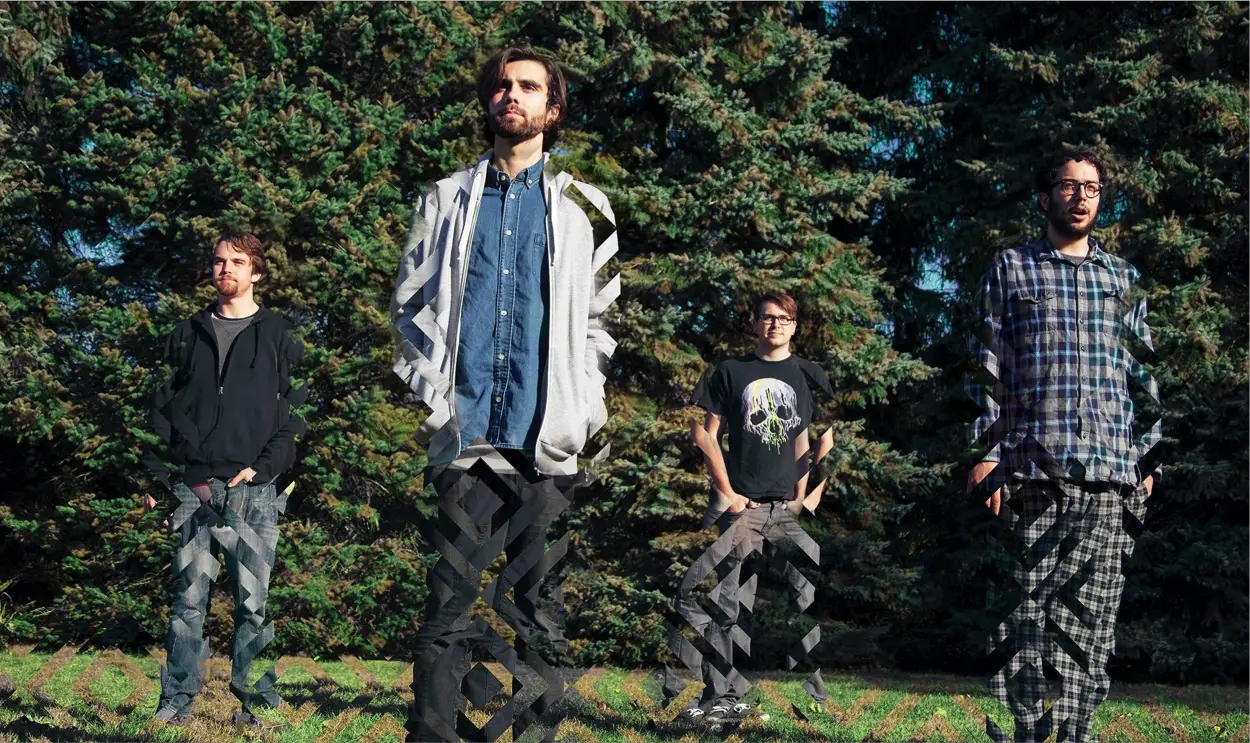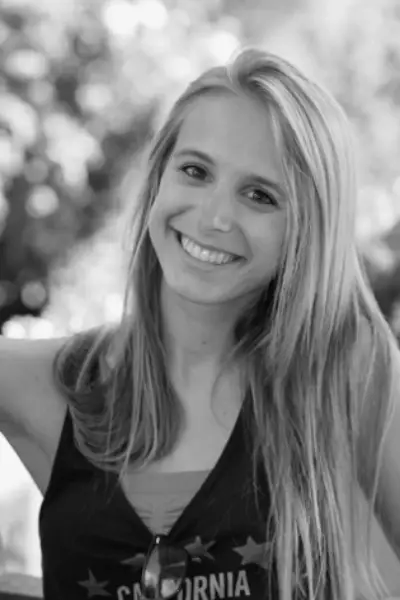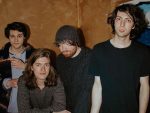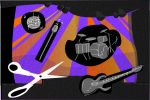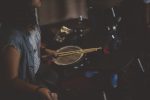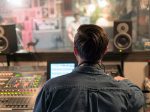I feel like I came to Bowling Green, Ohio, automatically knowing who Indian Opinion was, as if their music had been programmed in my brain.
The first time I saw the band perform was at a house party downtown, where my good friends were also playing in their own band at the time. Crammed into a tiny room and constantly being pressed up against others, I was awestruck by Indian Opinion. Their drive and style was like nothing I had seen or heard before. It was so different from the usual college band I was used to.
The band is comprised of four members, all of whom attended or currently attend BGSU: Mark Dylan (guitar/lead vocalist), 22, a music education major from Kings Park, New York; Benji Katz (bass), 22, a Master of Fine Arts candidate in poetry from Blue Ash, Ohio; Connor Mancini (trumpet), 22, a music and law student from Westlake, Ohio; and JP Stebal (drums), 23, a Bachelor of musical arts in the percussion field, from Bowling Green, Ohio.
These guys are able to draw in massive crowds at house parties, bars and arts festivals. Each member is dynamic, and the sound they create together is fresh, smooth, and moving. Aside from playing in Bowling Green, Indian Opinion has had shows in Cleveland, Columbus, Toledo and Cincinnati, as well as shows in Ann Arbor and Flint, Michigan, and several shows in cities in New York.
I was already familiar with some of the band members prior to meeting with them for an interview. Like myself, Katz was also a BFA student at BGSU in the Creative Writing program, and also like me, he has come back to BGSU to attain his MFA in Creative Writing, so I have seen him around on several occasions.
I was in BGSU’s marching band with Mancini for two years, standing next to him at one point during a show (I always referred to him as “the trumpet guy who plays really loud,” but I also had an overwhelming crush on him the moment I joined the marching band), as well as sharing some mutual friends.
The guys were able to answer questions seriously, but were not afraid to joke around and be themselves. Ultimately, they have a very Beatles-like friendship. They all bounce off one another, which was great to see.
Their music can be found on Bandcamp and YouTube, but the majority of their music can be found on SoundCloud. They also have a Facebook, Twitter and Instagram.
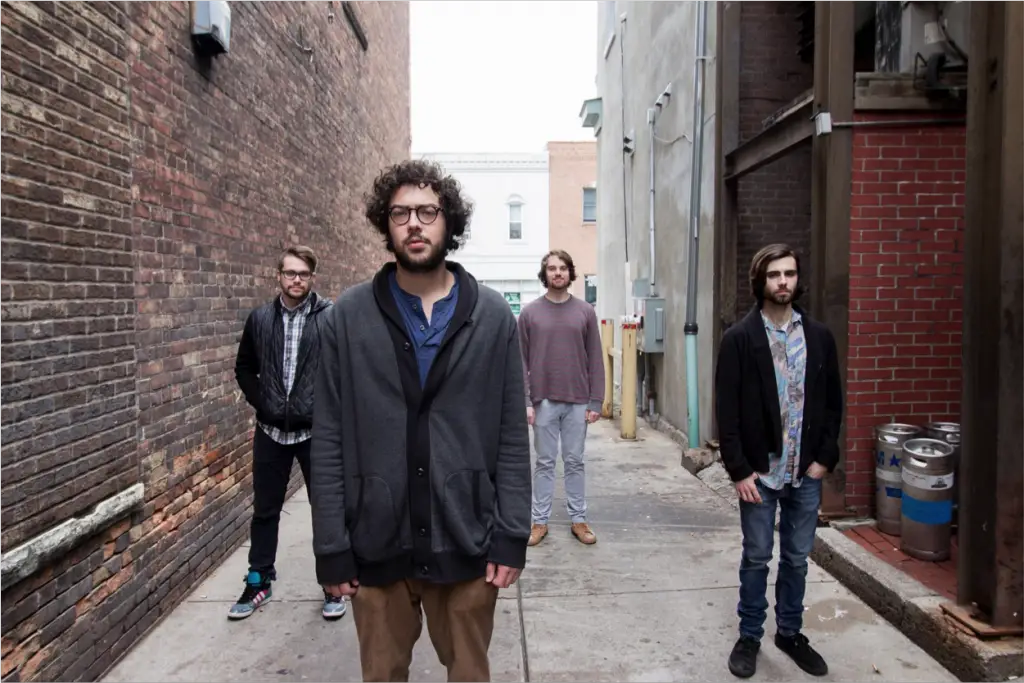
Q: How did the band form?
JP: Music school, the university, you know?
BK: I’m the only one who wasn’t in the music school, but Mark and I met through mutual friends during freshman year in the dorms. And then we met up with JP through the music school.
MD: And we jammed for like a year before we ever jammed as a group.
JP: Me and Mark got together at my house my junior year and just jammed, and then eventually Benji made it over. And he was definitely feeling it, and then the next year Connor started playing with us.
CM: I saw them all the time, and Benji is just the recognizable figure. Me and Mark lived in the same hallway freshman year; me and JP were in the marching band together, and Benji was in the same hallway our sophomore year. And then junior year, we were just hanging out together one time and I was asked to do a show, and then boom.
MD: Connor recorded a song with us before he was even in the band.
JP: Two songs, actually.
MD: We knew each other through the College of Music, so it was inevitable that we would all jam at some point.
JP: The music school really brought us together.
Q: You describe your genre of music as “toasted cheese psychedelic,” can you explain what exactly that means?
MD: Can someone explain it to me?
JP: Okay, you’ve got all these different types of cheese. You’ve got your mozzarella, you got pepper jack, you got American…
BK: It’s like a fondue pot.
JP: Yeah, it’s like a mixing pot, a melting pot of all these cheeses. You’ve got your different genres of music: jazz, spoken word, rap, hip hop, soul, funk.
BK: We got tired of looking confused when people asked us, “What type of music do you play?”
JP: Our buddy Sean is an interior design artist so he’d make us these flyers for shows. The first one he made for a house show he put our genre as “toasted cheese psychedelic,” so it kinda stuck. We rolled with it.
Q: What are the name origins of Indian Opinion?
MD: Honestly it was just like a textbook name. I got it from reading a history textbook and originally it’s from Gandhi’s newspaper, to get his word out. I just always thought it was an awesome band name, Indian Opinion, and it always stuck with me. And by the time that we started jamming, we said, “Alright, we need to make this a band.” And I thought Indian Opinion was perfect.
Q: Musically, where do you draw your inspirations from?
JP: That kinda goes back to the “toasted cheese” thing, because it’s all these different genres that we all listen to, we share with each other. We listen to a lot of jazz.
BK: Yeah, jazz is the common bond we all have. JP is more into brass bands.
JP: Yeah, like funk and stuff, and Benji and Connor like a lot more hip hop than I do. But they will share their music with me, and then Mark is kinda like, whatever he’s feeling.
MD: We all have a love for improvised music and how that can be recreated in the moment. And I think that’s huge for our sound, we love improvised music and that follows jazz tradition, it follows jam band tradition.
JP: A lot of people call us “art punk,” like soul. Someone at an Elyria show told us, “You guys are pretty much a soul band, but you have an aspect of punk.” I was surprised by that, but I could see where they got that from.
BK: I’d definitely say the commonality, influences, and improvised music are big for us.
MD: And that’s why we really love the live performance aspect, playing shows, because some bands you can easily say are studio bands. There’s a certain art in that, you know.
JP: But we like to create a new experience every time we perform so we’re not doing the same old songs again. It’s not gonna sound the same as we recorded it or how we played it last show. We want to make it different for that specific audience and venue.
MD: How we eat before the show affects how we’re going to play, you know what I mean? Who’s in the audience—is there someone you’re trying to impress or someone you don’t like in the audience? It’s going to affect your mind and your state of music. So everything comes into play.
Q: I know you guys have played so many different shows, which one would you say was your best?
CM: My two favorite shows were when we played a house show in Binghamton, NY, not this summer but the summer before, and my other one would be the Cincinnati show we played last year. The Binghamton one I liked so much because we had just driven eight hours to New York—it was our first show on our tour and we got there and the first thing we saw was people throwing kegs and breaking stuff in the backyard. And everybody there was just so nice and so friendly.
BK: That was madness.
CM: Everyone said, “You made this weekend, I’ll remember this forever.” And it was just like, “Wow.”
BK: And they had all just finished up with school, people were graduating, it was just chaos. I remember I clogged their toilet right before we went on. The band was like, “Where’s Benji? Where’s Benji? We’re about to go on,” and I’m just like…plunging their toilet.
CM: And Cincinnati was the most legit it’s ever been for us, I think. We got there and they said, “So what kind of beers do you like?” and we were like “What? Um…Yuengling?” and there were 2 cases of Yuengling waiting for us in our dressing room.
JP: We were opening for this band called Highly Suspect. They were Grammy nominated for best rock song, best rock album. We were the first band to open, there was another opening band after us. So that was like our first bigger show, seeing what it’s like, you know. The taste of the real world. That was definitely one of our best.
MD: When you have a great crowd, it fuels the fire.
JP: Yeah, and the only people we knew there were Benji’s friends from home and two of our friends. But most everyone there was there to see Highly Suspect. But we were playing for people who were interested in our music, and they’d never seen us before and that felt good.
BK: We play a lot of shows around Bowling Green and it’s great. I still would take a house show in front of all of our friends over anything. But it’s always a good test to know if you can take your show on the road and expose it to other people that don’t know us.
JP: I would say that house show on Wooster St. was one of my favorite shows. When everyone’s on the same page and not trying to mess up your house and trash it, they’re actually there to enjoy the music. It really helps when they’re there to really enjoy the music.
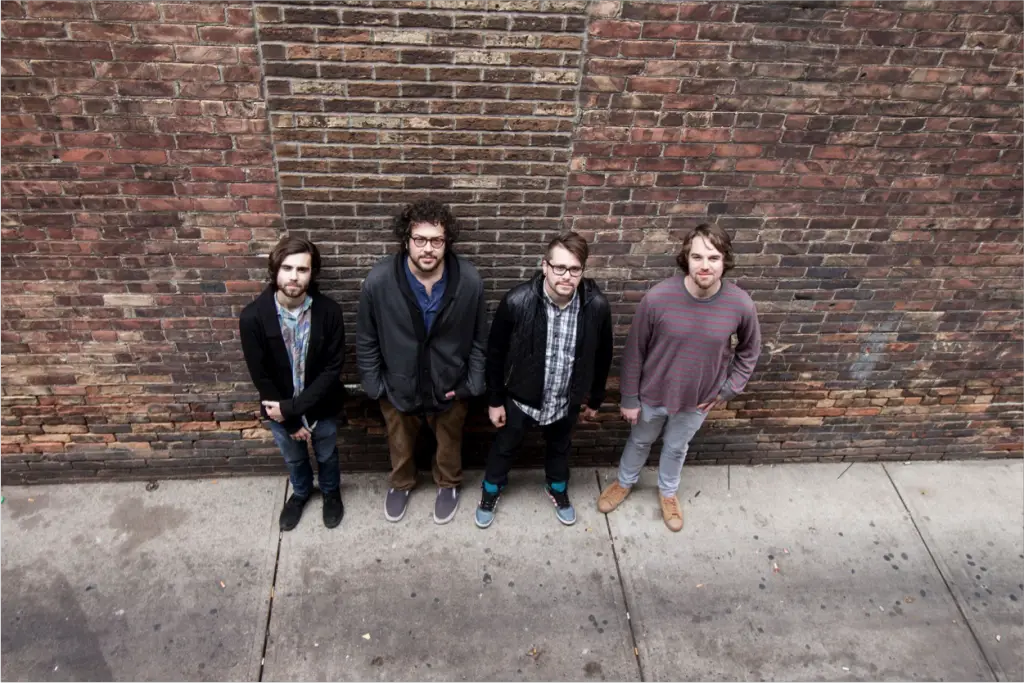
Q: How do you pick what you’re going to play for a show?
CM: We find a piece of paper or a popcorn container and then write it down.
MD: We make a set right before the show. It depends on the venue—it depends on the moment.
BK: We have enough originals to have us pick and choose which ones we’re gonna play. So if we haven’t played one in a while, we’ll bring it back in.
MD: That’s another beautiful thing. We tailor the set to the show.
BK: We usually do one cover per show. Because we improvise a lot, sometimes a four minute song will be a six minute song and we get to the end of the set and it’s too late to add in something else. We definitely try to pick the vibe of the venue and get a good flow in the sets.
Q: Do you have a song that you perform more frequently than others?
CM: Probably the newer ones we play more frequently but I’d say the most consistent one would probably be “Better Days” and “Cali Dreams.”
BK: We play “Better Days” a lot, I don’t think we’ve ever cut “Cali Dreams.” “Cali Dreams” is like our single.
JP: It’s weird though because it changes as we write new songs. We’ll say, “Oh we like this one a lot” so we’ll start playing that one a lot. The rotation changes as we make new material.
MD: Anytime you have a new song completed you just wanna play it and see how people react to it.
BK: We won’t cut a new song from the set for a long time.
MD: And now that we’re all back for the semester, that excitement’s back, you know?
Q: Can you describe your creative process when working on a new song?
BK: Mark and I usually write songs, we’ll write the structure of a song. I usually write lyrics. Sometimes I’ll match a poem to a song cuz it feels like it fits. And when we show the song to the guys, Connor will write a horn line, or JP will change the groove. It’s definitely a collaborative experience.
JP: I like to ask them when they write a song what they’re thinking about, what it’s really about, what kind of feel do they want.
BK: Yeah, JP’s always thorough about getting the meaning of the song.
JP: I don’t want to have something opposite in mind. It’s all relative, but really it’s Benji’s or Mark’s song and it means a lot to them, so it should be what they want to hear, ultimately.
MD: Yeah, it’s definitely collaborative like Benji said. We write the structures mostly but then it’s such an organic process. Like, let’s see where it goes. It’s never what you think. We all have a voice.
BK: It’s like raising a kid. You know, you can control it but then it’s gonna go off to college and put a safety pin through its nose. Connor’s trumpet is that safety pin.
MD: And it’s also cool because Benji has the creative writing background, but also music, and then I have a different history as a musician so we have contrasting writing styles, but it all comes together. It’s a uniform sound.
Q: How often do you guys rehearse?
BK: Well, we all live together now, so it’s not firm in the schedule. If we have a show coming up, then it’s a rehearsal. We’ll usually run through a set or prepare in that sort of structured way, but oftentimes it’s just like, “You guys wanna jam?”
MD: Yeah, there’s gotta be some freedom in just jamming, not worrying about deadlines. There needs to be some freedom as musicians, so we can just learn how each other works.
BK: You have to learn everyone’s tendencies and what they’re going to do in what situation, and just learning how to communicate with each other non-verbally.
MD: And to take risks, you know? Like just try something. You need that out there, so you can grow.
Q: How has your music evolved since you first started playing together?
BK: I’d say we definitely improvise more cuz we’re just more comfortable with each other and less afraid to mess up.
JP: Each show it seems like we kind of go out there a little bit more than we would have.
BK: Yeah, it’s more interactive.
MD: Every show, you wanna pull a move that the other guys don’t expect. We challenge each other as musicians.
BK: It’s cool being in a band this long cuz you definitely see a change in the relationship.
MD: But even as a songwriter too, I’ve feel like I’ve grown so much in that aspect, just because every song, it’s another challenge, you know. And just practice. We’ve been practicing for years and making music for years.
Q: What’s been your biggest challenge as a band?
BK: I’d say it’s always tough to balance our interests as students and our interests as musicians. It’s always a balancing act. And just getting out there, traveling. It’s always more challenging to get a gig somewhere and then making sure everyone’s free, and knowing if people are going to be in the crowd, or if you’re going to show up and it’s going to be a crackhouse in Columbus. We’re musicians who have been focusing on music for much of our adult lives. But learning the logistics of booking shows and being professional as a band I think has been more of a challenge.
JP: Yeah, we can get so comfortable at Howard’s Club H, playing there on a monthly basis.
Q: What are you guys working on currently?
MD: New material now, cuz we’re back at it. We’re booking shows right now. So it’s mostly just preparing for what’s up and coming.
JP: We kinda have a goal to record a full length over the next year or so.
BK: Over the summers Mark goes back to New York so we kind of recharge our gears and come back with new material.
MD: We also tour every summer.
BK: Yeah, we tour at the beginning or the end, but summer is sort of a good time to decompress and come up with new material. But now it’s time to pick back up.
MD: *motorcycle noises*


